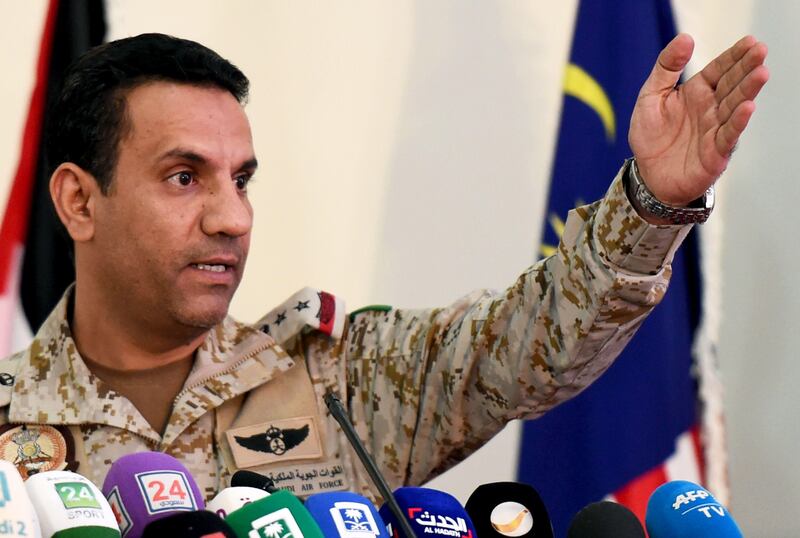The Saudi-led coalition on Monday blamed Iran for supplying Yemeni rebels with a ballistic missile launched at Riyadh and called the attack “an act of war".
Saudi Arabia responded with a list of 40 names wanted for their links to the Iran-backed Houthi rebels and rewards totalling US$440 million (Dh1.6 billion) for information leading to their capture. The kingdom said on Sunday it had also closed all air, sea and land borders with Yemen, allowing only humanitarian supplies to pass through.
The coalition of Arab countries said Iran supplied the rebels with the missile that was fired from Yemen shot down north of the Saudi capital on Saturday. The missile type, a Burkan H-2, was also fired towards Saudi oil refineries in Yanbu in July and Mecca last month.
Coalition experts analysed fragments from the missiles and concluded that they were provided by the Iranian regime, despite the Houthis claiming they were made in Yemen.
"The Coalition's command considers this a blatant act of military aggression by the Iranian regime, and could rise to be considered as an act of war against the Kingdom of Saudi Arabia,” Saudi Press Agency reported.
The coalition also said the kingdom had a "legitimate right" to defend its territory and people and reserves the right to respond to Iran according to “international law and based upon the right of self-defence.”
_____________
Read more:
Saudis name and put price on heads of 40 leaders of Houthi terror groups
Houthi attack on Riyadh highlights Yemen missile threat
_____________
The central command of the coalition also warned that Yemeni civilians need to avoid all areas where there are active combat operations and Houthi militias are present.
Adel Al Jubeir, the Saudi foreign minister, said the Yemeni "militias would not have continued operations without the support of the greatest sponsor of terrorism in the world - the Iranian regime".
The foreign minister accused Iran of "destroying all attempts to find a solution in Yemen, which has led to the failure of all political negotiations between the government and these militias".
Iran rejected the statement as "ridiculous and baseless", according to foreign ministry spokesman Bahram Ghasemi.
April Longley Alley, senior analyst at International Crisis Group, said the missile attacks and subsequent response by Saudi Arabia might be the war’s most dangerous trigger point and could lead to military escalation.
“The stakes could not be higher. There is a possibility of a missile strike by the Houthis, particularly if it results in casualties, resulting in a direct US confrontation with Iran,” she said.
Ms Alley said the Houthis view their ballistic missiles as their best bargaining chip in the case of negotiations and will continue launching attacks as long as the war drags on.
The wanted list, labelled the “Iranian terrorist militia elements in Yemen”, included a bounty of $30m for Abdulmalik Al Houthi, the leader of the rebels in Yemen.
The list includes the Houthi leader’s brothers, other family members and members of the Houthi hierarchy. Saleh Ali Al Sammad, second in command, has a bounty of $20m.
Al Sammad has risen in the Houthi ranks to become the leader of the Supreme Political Council, which governs Houthi-controlled Yemen.
Al Sammad served briefly as political advisor to the internationally recognised president Abdrabu Mansur Hadi before Mr Hadi was forced to flee Sanaa after the Houthis seized control of the capital. The Saudi-led coalition has been fighting alongside forces loyal to the Yemeni president against the Houthis and their allies since March 2015.
Surprisingly, not featuring on the list is former president Ali Abdullah Saleh, whom for decades Riyadh backed until he resigned under pressure from vast Arab Spring protests in 2012.
But in 2014, Mr Saleh aligned himself with the Houthis, against whom he had fought six wars when he was president. The two now jointly control Yemen's northern highlands and the capital Sanaa.
His omission from the list is confirmation of reports earlier in the summer that a falling out between the two parties might have originated from a Saudi-brokered peace deal that the Houthi leader refused.
In the last two years of fighting, the coalition has driven the Houthis from much of southern Yemen but the fighting has become bogged down in Taez province and along the Red Sea coast.
The coalition claims the Houthis are increasing their reliance on Hizbollah in exchanging military expertise.
ISIL and extremist rival Al Qaeda have taken advantage of the war to bolster their presence in the south. ISIL said it carried out a major attack on a security compound in Aden on Sunday aimed at a top-ranking official that killed more than 15 people.
The coalition said Yemen’s borders had been closed "to fill the gaps in the inspection procedures, which enable the continued smuggling of missiles and military equipment to the Houthi militias loyal to Iran in Yemen".
“It is not clear, however, that this will have a significant impact, with the current blockade and entry limits apparently not achieving this aim,” said Miriam Eps Regional Security Analyst at Le Beck International.
Although humanitarian activities are expected to continue, Ms Eps thinks that the closures are liable to slowing down the entry of aid, “impacting the already existing crisis and affecting the average Yemeni more than Houthi fighters.”





